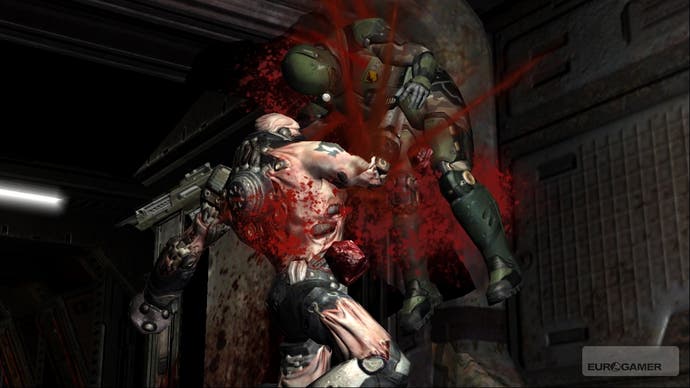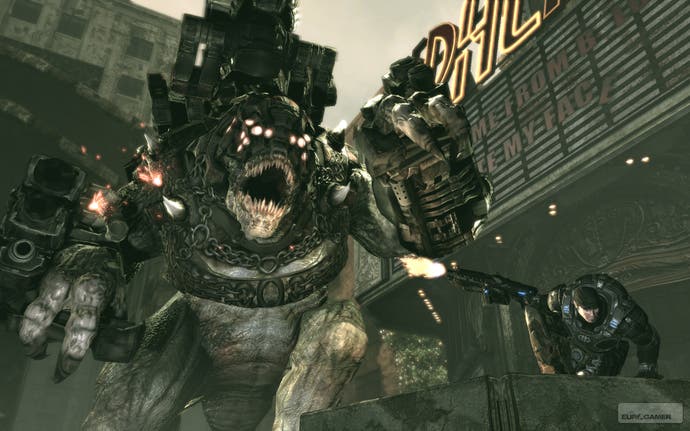id Software
Todd Hollenshead and Tim Willits on technology, development, Manhunt and QuakeCon.
I think that just, as a medium, games can be anything that people want them to be. It's just a matter of what it is that you want to do, what developers and your creative people are interested in working on. We're sort of the big-budget, action movie studio of the games business. We like the adrenaline-pumping, run-and-gun, boom-blow-stuff-up, look-at-that-happen summer blockbuster kind of thing. That's sort of the games we like to work on. And we have different franchises within how that stuff works. But I don't think there's any limitation on what games can do. They're really only limited by people's imagination and how they go to implement.
Now, as technology continues to progress, the ways in which you can do the things that you can do, and what they look like - the character interactions and the believability and the immersion factor - I think that those are all things that everybody's talking about, that they want to...that's where you have opportunities to look better, feel more realistic, and be more like the Holodeck, right?

I would never say that we've worked on the last of something on franchises that are sort of the core of the company. There's not really anything specific that we can talk about at this point on those, but those franchises are still alive in idea form.
We have good brands, we want to expand on those brands, and that's why we're working on a new brand. But we have a really great direction and production team that can work really well with other companies like Splash Damage on Enemy Territory to expand the multiple brands that we do have.
Yeah, and, you know, like Raven with Wolfenstein. You can put two and two together and see maybe where we might be going with some other stuff.
No [laughs]. Microsoft sometimes gets a bad rep for being Microsoft. But they really do know how to write software. One of the great things about 360 games - it's the same with PS3 - is you send them for certification, they run it through the gamut of tests, they make sure that you adhere to all the things you need to, and then when the gamer gets it it's going to work. So for Games for Windows you'll have a certification, it'll go through Vista, you'll have the correct ESRB ratings. So that works. You'll have good security, you'll have a link in with Xbox Live...
Some people say it's a little too Big-Brotherish, but it's a legitimate progression of making the PC feel more - not like a console, but like a closed system. For us, if there's a way to link a Live account into your security for your game in a nice closed system, it would help reduce the piracy, which kills us, and is killing the industry. At least Microsoft is doing something, and I think that they're in a position to do it.
I believe it will help us in the future. The whole system's young and Microsoft's made some mistakes, but they're fixing it. As we move forward, if it can help prevent piracy, if it can help people connect together, if it can help things be more uniform, so when end users buy any PC game they know how to connect, they know how to search for games - I do think it will help the games industry, and it's just the way things are going to need to move.

That's a tough one. I don't know that that's a solvable problem, because I think that your tastes change from a novice gamer to a veteran or a hardcore gamer. When you first get in and play with a type of game, everything is a challenge, but as you get experience you want different and greater challenges, which necessarily make a game hard to approach from a novice standpoint. I still think that one of the biggest differences between PC and consoles games is their level of approachability - with console games, it's an industry paradigm that you have to make them more approachable than is required to make a PC game, because you know that most PC gamers are going to be...you can expect some level of this not being the first game that they've played.
Well that's really QuakeCon [id's annual fan convention, taking place 2nd-5th August in Dallas].
Certainly we can talk about Enemy Territory, so that's in beta now and we're showing the 360 out there. We don't have the PS3 here but that is in development. I think the update on that stuff is that we've got bots in all of the SKUs - in PC, and we're working towards -
AI-controlled opponents, dude.
Fair point. AI-controlled opponents. Fine me a nickel. And then John continues to work on cell-phone stuff. We just had the announcement that Orcs & Elves is in development for the DS with Electronic Arts, by Fountainhead. I think that came out in the press release yesterday. If it didn't...announcement! Get that little ticker symbol in the background. The big news about the new stuff - I mean, [at E3] we wanted to have stuff we could show, not just talk about, which is Enemy Territory and some of our technology stuff, but we're going to hold off on discussing stuff that we really don't have a lot to show about until QuakeCon.
So if you happen to be in Dallas in about three weeks, you should try and make it out, and if not, stay tuned.
